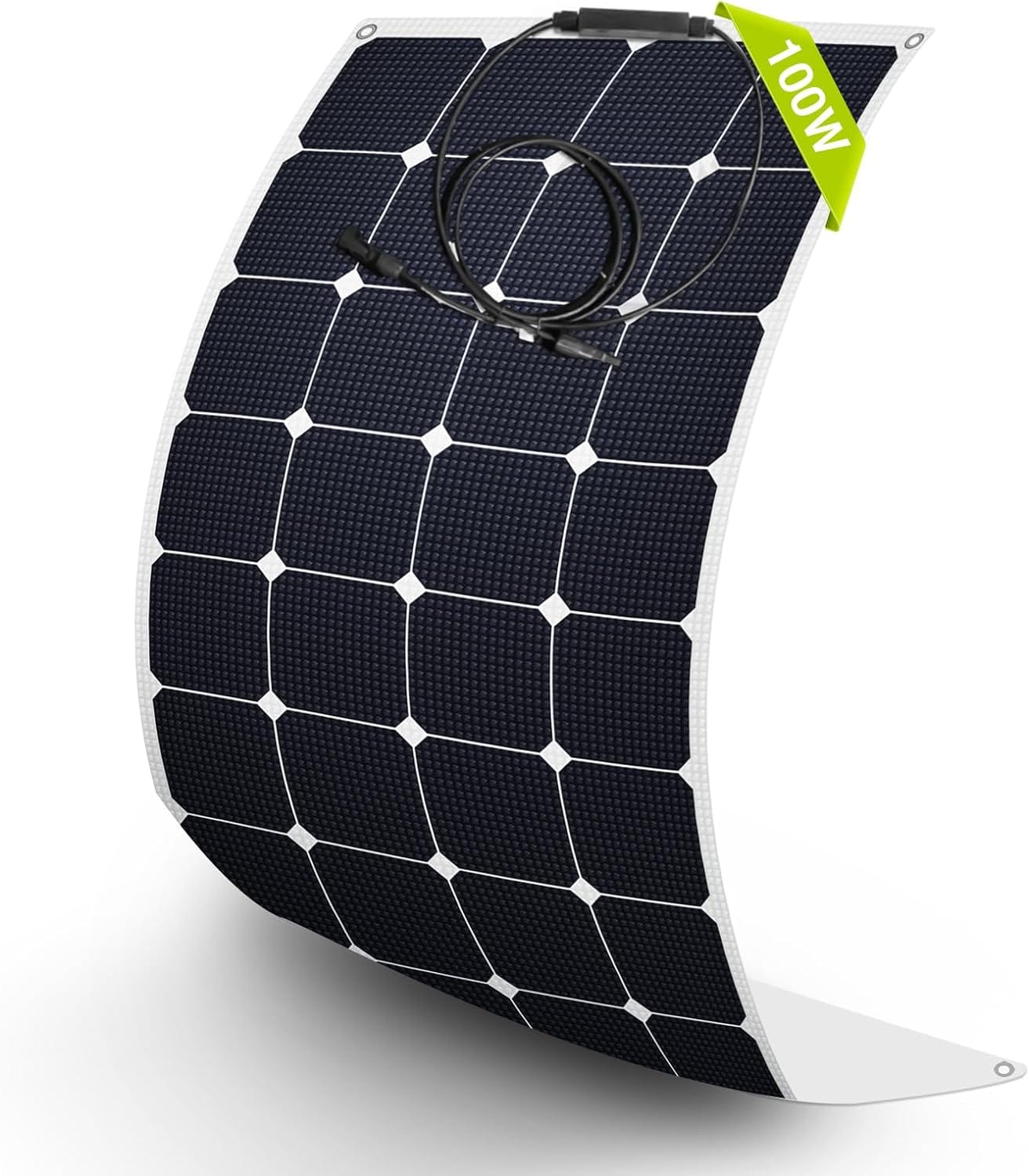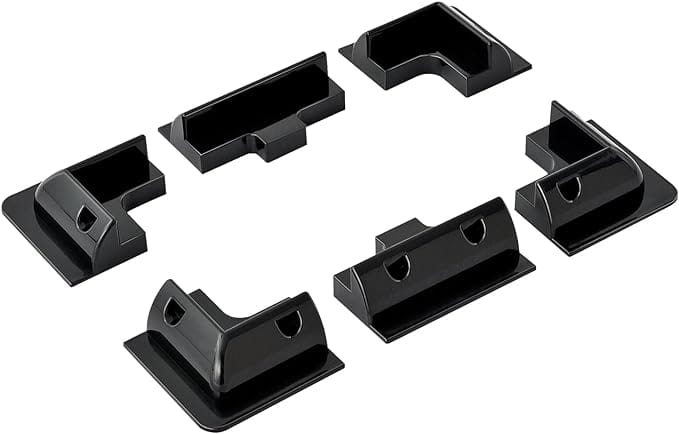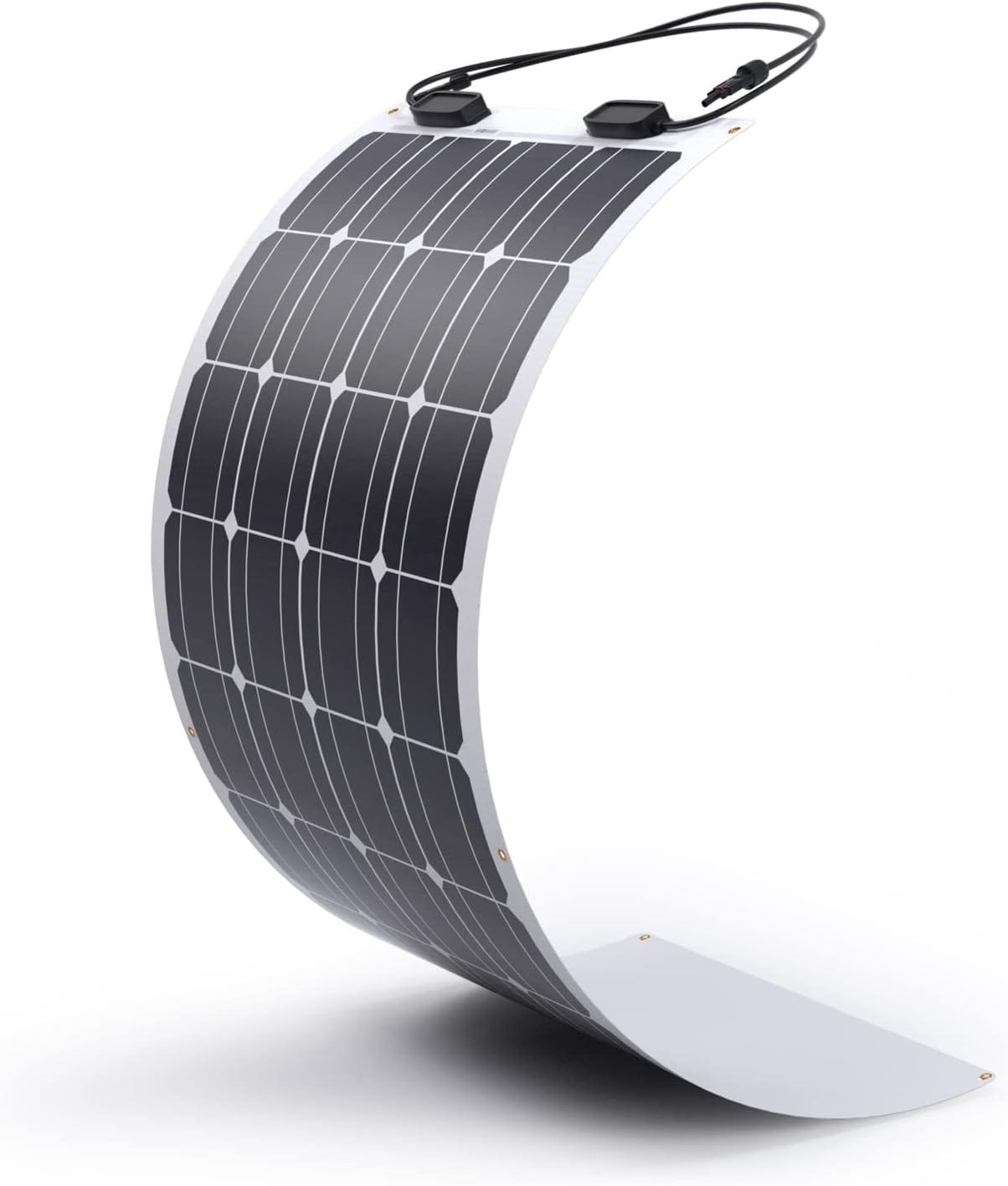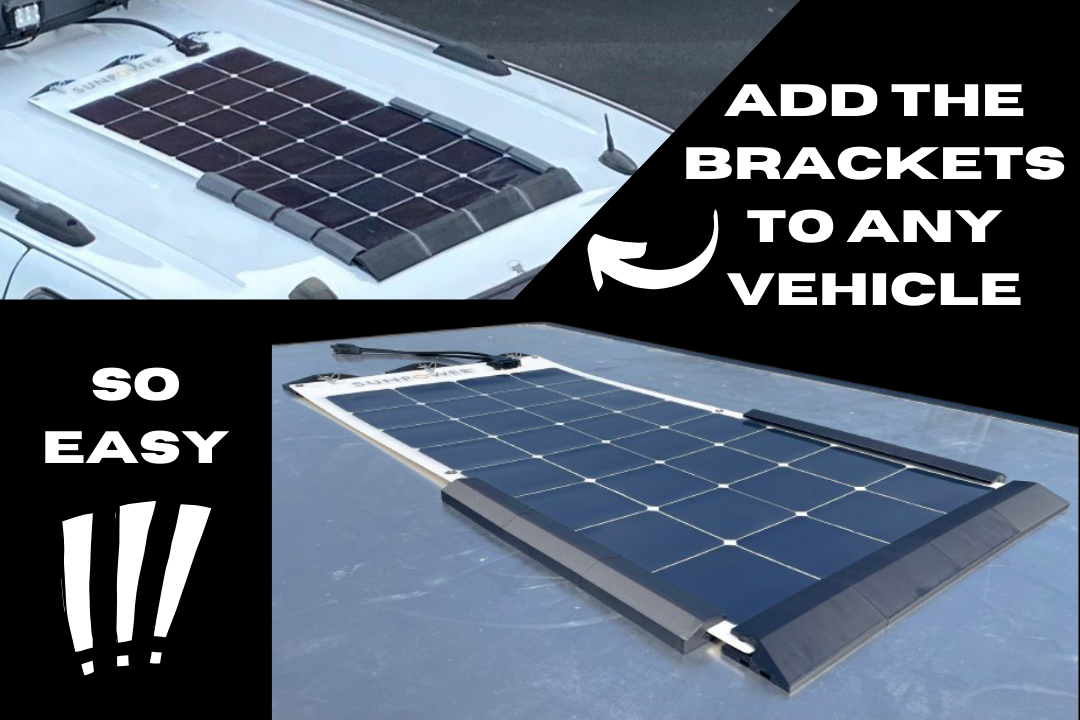Best Solar Panels for Car Rooftops [Power Devices Off-Grid!]
![Best Solar Panels for Car Rooftops [Power Devices Off-Grid!]](/content/images/size/w1200/2023/11/Best-Solar-Panels-for-Car-Rooftops.png)
Powering all of your important electronic devices while living in a vehicle can be a major problem.
I’ve researched the best solar panels for car rooftops - all costing $150 or less - and will give you the complete skinny in this article!
Many nomads rely only on their car’s cigarette (12V) port for most of their energy needs, but this might not be enough if you have several items that need juice regularly.
Even if you also own a portable power station, how will you constantly recharge it while on-the-go?
These obstacles are very real headaches for car dwellers, and the easiest solution is to buy a solar panel, which will utilize the sun’s energy to provide you with unlimited charging power.
However, not all panels are created equal, and you don’t want to waste your money on a piece of crap that won’t work, or will go kaput after a few months.
Each of these solar panels are winners: they’re lightweight, flexible, and can power most low-consumption energy items, like; laptops, tablets, smartphones, 12V ovens, and even 12V refrigerators & freezers!
Newpowa Flexible Solar Panel 100W

Newpowa Ultra Lightweight, High Efficiency, Flexible 100W Solar Panel - 12 Volt Monocrystalline
Pros
- Extremely flexible and adaptable to curved surfaces
- Ultra lightweight, making transport and installation easy
- Highly durable, capable of withstanding extreme weather conditions
Cons
- Slightly lower power output compared to rigid panels
- Higher cost than some other flexible solar panels
The Newpowa 100W Ultra-Lightweight Panel (4.19 lbs) is only 0.12-inch thin, making handling and installation a breeze. It's perfect for mounting to the rooftop of a vehicle.
Balancing form and function, this panel boasts SunPower solar cells for higher conversion efficiency. Plus, it's built for durability, with IP68 waterproofing and advanced high-temperature soldering that improves encapsulation loss, reduces operating temperature, and increases output.
With easy installation options like four metal pre-drilled holes and connectors, you'll have your solar panel up and running in no time. It's also built to handle harsh weather conditions, like strong winds, hail, and snow loads.
Best of all, this solar panel comes with a 5-Year Limited Material and Parts Workmanship Warranty and a 12-Year 80% Output Warranty.
Key Features
Ultra Lightweight
Weighing in at only 4.19 lbs and 0.12 inches thin, the Newpowa Flexible Solar Panel is much lighter than conventional solar panels…and even other flexible panels.
Excellent Quality
Newpowa has equipped this solar panel with IP68 waterproofing, advanced high-temperature soldering, and high-efficiency monocrystalline solar cells.
The solar panel also features hyper-cell string ribbons, which contribute to various benefits such as low encapsulation loss, lower operating temperature, and higher output. These features ensure that your solar panel is of top-notch quality and can withstand various elements.
Easy Installation
To make things even simpler, the Newpowa Flexible Solar Panel has four pre-drilled metal holes and connectors, which help with a fast and easy installation.
Renogy Flexible Solar Panel 100 Watt 12 Volt [Monocrystalline]
Pros
- Great flexibility for installation on irregular surfaces
- Lightweight and easy to install
- High conversion efficiency with monocrystalline solar cells
- Renogy is a well-known leader in solar panel manufacturing
Cons
- ETFE material might not be as durable as traditional solar panels
- Renogy panels usually cost more, as they’re a reputable, well-known brand
The Renogy 100 Watt 12 Volt Monocrystalline Solar Panel is great for vehicle dwellers and those living off-grid. Designed to combat the inconvenience of mounting standard solar panels on curved surfaces, this versatile option can easily adapt to meet a wide range of applications.
One of the major advantages of this solar panel is its ultra-lightweight design. With advanced polymer materials, it weighs 70% less than conventional solar panels. This makes handling and installation a breeze, especially when it comes to scenarios where mobility and ease of mounting are important factors.
Despite its flexible design, the Renogy solar panel is highly durable. It has been rigorously tested and is designed to withstand extreme wind and snow loads. This ensures its suitability for use in a variety of environments, giving you the confidence to rely on it in various weather conditions.
On the downside, the flexibility and lightweight nature of this solar panel somewhat affects its power output. The panel may not perform as efficiently as hard-sided solar panels, which could be a concern for those seeking maximum efficiency. Additionally, the Renogy Flexible Solar Panel is priced slightly higher than other flexible solar panels on the market.
Lastly, the flexible nature of the panel may potentially limit its lifetime compared to its rigid counterparts, although the durability of the panel has been tested to withstand harsh weather conditions.
Bottom line, the Renogy Flexible Solar Panel is a fantastic option for those seeking a versatile and lightweight solar power solution, especially for car rooftops and other curved surfaces.
Topunive 100W Flexible Solar Panel

Topunive 100W 12V Flexible Solar Panel 9BB Monocrystalline Cell 12 Volt Semi-Flexible for Marine RV Trailer Boat Cabin
Pros
- Extremely flexible for various mounting options
- Lightweight and easy to install
- High conversion efficiency with 9 busbars solar cell
Cons
- 5mm grommet may require modification for certain applications
- Some users report inconsistent output
- Potentially not as durable as traditional panels
The Topunive 100W Flexible Solar Panel boasts an impressive degree of flexibility, allowing you to mount it on a variety of curved or uneven surfaces. This panel is only 0.1 inches thick and weighs a mere 4.4 pounds, making it easy to apply on your desired surface.
Featuring a 9 busbars solar cell design, this panel can achieve a high conversion efficiency of up to 23%. This ensures that you're making the most of the available sunlight to power your devices and recharge your batteries.
However, some users have reported inconsistent output when compared to similar products, so it might be wise to keep this in mind when making a decision.
Although the panel is waterproof and dustproof, it may not be as durable as traditional glass and aluminum models, but this is the norm among flexible panels, and is one of the small trade-offs in using them.
In addition, the provided 5mm grommet for mounting could require modification depending on your specific application, which may be a drawback for some users.
Bottom line, if flexibility, convenience, and ease of installation are your top priorities, the Topunive 100W Flexible Solar Panel should be on your list of considerations.
Solar Panels for Car Rooftops Buying Guide
When choosing the best solar panels for your car rooftop, there are several factors to consider. By prioritizing the following features, you can ensure that you make an informed decision that meets your specific needs.
Efficiency
The efficiency of a solar panel tells you how much sunlight it can convert into usable electricity. Higher efficiency panels produce more energy in the same amount of space, making them a better choice for car rooftop applications. Look for panels with efficiency ratings of at least 15% to ensure optimal performance.
Size and Weight
Consider the dimensions of your car's roof before purchasing solar panels. Measure the available space and keep this in mind when shopping for panels. Remember that lightweight panels can improve fuel efficiency and reduce the strain on your vehicle's roof. Flexible solar panels can also be a great option if you have a curved or irregular roof.
Power Output
It's essential to choose solar panels that produce enough power to meet your energy needs. Solar panel output is rated in watts, so calculate the total wattage you require by adding up the wattage requirements of your devices and appliances. Try to aim for a panel with a slightly higher wattage, as real-world performance can be lower than the rated output.
Durability and Weather Resistance
Car rooftops are exposed to harsh weather conditions, so it's crucial that your solar panels can withstand various elements. Look for panels that are resistant to water, dust, and UV radiation. Additionally, consider the panel's build quality and warranty, as these factors may indicate long-term durability.
Here's a quick comparison table to help you assess the key features:
| Feature | Ideal Specification | Description |
|---|---|---|
| Efficiency | At least 15% | The percentage of sunlight that can be converted into usable electricity |
| Size and Weight | Fit on your car roof | Make sure the panels do not exceed the dimensions of your car roof and are not too heavy |
| Power Output | Sufficient wattage | Match the output to your energy needs with a slightly higher wattage for optimal performance |
| Durability | Weather-resistant | Choose panels that can withstand various weather conditions and have a solid warranty to ensure longevity |
By keeping these features in mind while shopping for solar panels, you can confidently select a suitable product for your car rooftop installation.
Frequently Asked Questions About Solar Panels for Car Rooftops
What are the top solar panel brands for car rooftops?
There are several reputable solar panel brands for car rooftops, such as Renogy, Newpowa, Dokio, and SunPower, just to name a few. These brands have a track record of producing high-quality, efficient, and durable solar panels, and online reviews are overwhelmingly positive. However…
It's important to research and compare any panel based on your specific requirements and preferences, as there are MANY other brands aside from those I’ve listed that also work very well, and may even be cheaper in price.
How do you install a solar panel on a car roof?
There are lots of ways to mount a solar panel to the roof of your vehicle. Some nomads use strong suction cups, metal brackets, or roof rails, while others attach the solar panel to a sturdy platform of some sort - wood, PVC pipes, etc. - which is then affixed to the roof directly.
If you aren’t handy, or don’t want to screw anything into the roof your vehicle (or both), the following products will make things MUCH easier. These brackets essentially mount to your roof by magnets or adhesive, and the solar panel can then be glued, calked, screwed, or slid onto the brackets themselves. Here are 2 examples…

RICH SOLAR Solar Panel Roof Drill-Free Corner Bracket Mount for RV, Boats, Caravans, Marine, Motorhomes - Set of 6(Corner Bracket)
What size solar panel is ideal for living in a car?
The ideal size of a solar panel for vehicle dwellers or car camping depends on your energy needs, available roof space, and desired level of portability. Smaller solar panels (40-50W) are suitable for light power needs, such as phone charging and LED lighting.
For heavier energy demands, such as powering a portable fridge, laptops, and similar items, a larger panel (100-200W) might be necessary. Panels of this power output are the sweet spot for most vehicle dwellers. This is why I recommended the varieties that I did.
Are vehicle-mounted solar panels efficient?
Vehicle-mounted solar panels can be very efficient, provided they're properly installed and maintained. Factors such as the panel's angle toward the sun, cleanliness, and quality of components can also impact the kit's performance, however.
Although hard-sided solar panels may have higher overall efficiency, flexible vehicle-mounted solar panels can still generate a significant amount of power for various needs on the go.
What factors should be considered when choosing a solar panel for my car?
When choosing a solar panel for your car, consider factors such as the panel's power output, size and weight, installation and mounting options, durability, and warranty. Determine your energy needs and available roof space to select a suitable panel size. Opt for a reliable brand that offers a comprehensive warranty and ample customer support.
How do solar panels for car rooftops compare to traditional rooftop installations?
Solar panels for car rooftops are generally smaller, lighter, and flexible versus traditional hard-sided rooftop panels. They're designed to meet the unique requirements of mobile power use, including aerodynamics and limited space.
Additionally, car rooftop solar panels may require unique mounting systems and may operate at a slightly lower efficiency due to varying angles toward the sun as the vehicle moves. However, they still provide a valuable renewable energy source for a wide range of camping and off-grid uses.
Can I use the briefcase-style portable solar panels instead?
I specifically recommended flexible rooftop panels that you’ll need to mount to the roof of your vehicle, as opposed to the portable “suitcase” style panels. This is because most vehicle dwellers stealth camp the majority of the time, and setting up a solar panel outside of your car in a parking lot or similar space would look really goofy and bring unwanted attention. Of course…
You definitely can use briefcase-style solar panels if you choose, but it’s really location dependent if you’re a stealth camper, and it might be difficult. On the other hand, if you’ll be staying at campgrounds, BLM areas, and similar locals, the briefcase-style panels are awesome solutions that will work equally as well.
Bottom line, my opinion is that it’s much easier to attach the panel once, and then never have to deal with it again.
Final Thoughts
Living in a vehicle doesn’t mean having to live like the Amish. With a small investment in the right setup, you can power almost any electrical devices that you need, just as you would in a house or apartment.
While this article isn’t meant to be an academic thesis on how solar works, it DOES illustrate how easy it is to start using a solar panel for your vehicle’s rooftop. After buying the panel itself, you’ll need a portable power station, and a mounting solution to affix the panel to your car. That’s it!
For a one-time cost of $500-$1,000 (solar panel, power station & mounting kit), and an hour or two for applying to your rooftop, you’re in business, and should never have to worry about charging your electrical gear in your home-on-wheels.
Best of all, by using the power of the sun you can say goodbye to electricity bills forever :)
LIVE WISELY, LIVE WELL!



